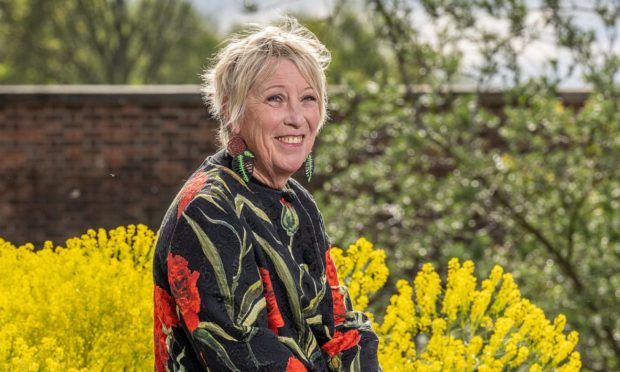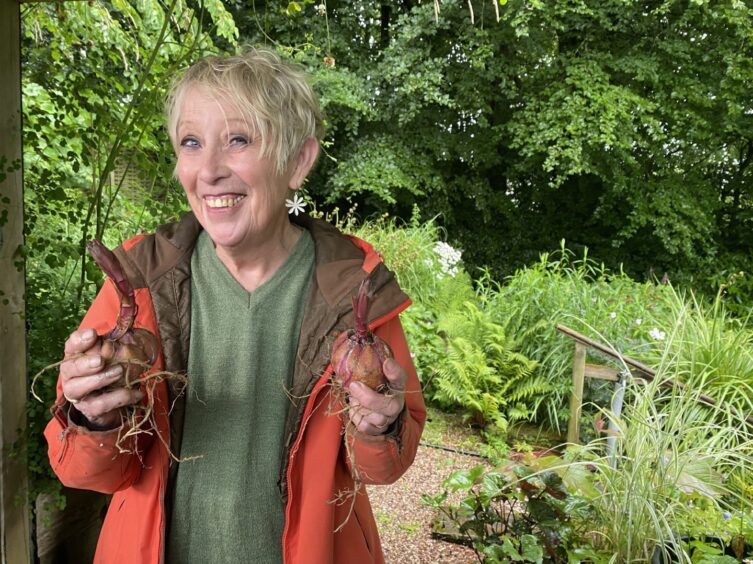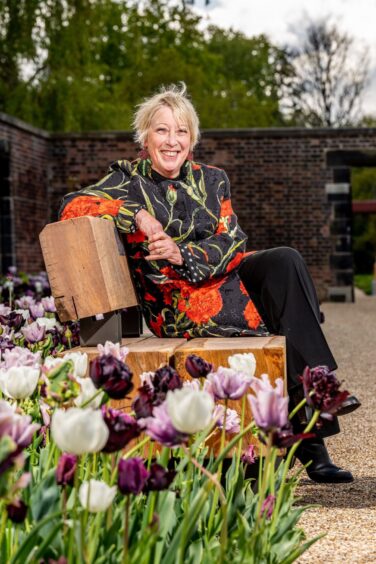
Carol Klein has just returned home after four days of filming for a segment on an upcoming edition of the BBC’s Gardeners’ World and she is mulling over what she plans to do next.
There’s the six-acre field next to the house that she’d like to turn into a nature reserve, the daughters and grandchildren she loves to spend time with and a packed polytunnel filled with plants just waiting to go in the ground, but she has other ambitions to ponder too.
“I could go exploring, that’s what I wanted to do when I was eight, and I still want to do it,” she says in that familiar, cracked voice in which, over the years, she has shared her enthusiasm for gardening with a huge TV audience.
Of course, as well as Gardeners’ World, she’d need to fit her adventures around writing her weekly column for Garden News and tending to her huge, flower-filled garden at Glebe Cottage in Devon, but we should not be too surprised if, at some point in the future, she picks up a rucksack and, along with her husband Neil, hitches her way to the lily fields of China or heads to the upper reaches of the Amazon in search of some fabled orchid.
A colourful career
In a life packed with adventures, Carol has always had one foot out the door, ready to discover what the world has to offer. Her unquenchable curiosity has taken her down many different avenues and into a multitude of jobs. She has, at various times, been a shop assistant, a bus conductor, an illustrator of archaeological artefacts in Rome, a factory worker and, for many hugely satisfying years, an art teacher.
There have been spells as a dishwasher and a cleaner as well as time spent as a playleader in an adventure playground, a role for which her upbringing on the back streets of Manchester left her perfectly qualified.
And growing alongside all of this, insinuating their way into every aspect of her life, there have always been plants.
Her earliest memories are bound up with the flowers that grew in her grandmother’s garden and in her various childhood homes, and she has a particular passion for the wildings that pushed their way through cracks and rubble in the alleys, junk yards, railway sidings and post-war bomb sites where she and an assortment of young friends, most of them boys, enjoyed the sort of free-range upbringing that has been lost to today’s generation of children.
All of her passions, of which there are many, are crammed into the pages of Hortobiography, a glorious and almost dizzying account of a life lived right to the very edges, where the vivid chapters, full of colourful characters, are interspersed with plant lore and gardening advice.
Fighting injustice
There’s the night she spent sitting fully clothed in a bath discussing art with John Lennon just months before the first Beatles album was released; tales of hitchhiking across Europe both with girlfriends and on her own; and the time she made history by being the first person to raise a case under the Sex Discrimination Act when it was introduced in 1975, enraged that she had been passed over for promotion in favour of a less-qualified man.
The court dismissed her claim as “retrospective”, but that did not stop her battling injustice wherever she encountered it, which led on one occasion to her squaring up to a member of the National Front.
“I still feel a bit guilty about that,” she says. “It isn’t really possible to hit someone lightly with a stool.”
After attending art school in Swansea and Brighton, Carol made the switch into teaching, spending part of her career in the East End of London where she witnessed at first hand the poverty brought about by the decline of the docks.
She also saw the issues that immigrant children faced in the classroom and through the Women’s Workers League she fought for the rights of black girls who had been unfairly excluded.
“Teaching was very important to me and I’m still in touch with some of my students,” she says.
Meanwhile her personal life was as colourful as her artwork and included an early marriage that was quickly dissolved. Then one night, at a Community Party meeting in Hampstead, she met a young man called Neil Klein, who she dated on and off, however when they left a party together a year later, she says: “We walked and walked and when we opened the door to my flat it opened the door to the rest of my life.”
A few years later Carol got a job in a school in Devon and it was on a snowy day in 1978 that she first saw Glebe Cottage, which has been her home ever since. The cottage sits on a south-west slope, surrounded by high trees and the primrose-studded banks for which Devon is famous. In recent years Carol has shared the space that she has created in her BBC2 series, Life in a Cottage Garden, but no garden existed when she and Neil moved in.
Where now there are flower beds, fruit trees and the hum of bees, there was only rubble and the rusting hulks of half a dozen old cars. One, a Morris minor, was so firmly embedded that it couldn’t be shifted, so they used a digger to squash it flat and then covered it with soil.
“A few years later I planted a Cornus Norman Hadden on it and it has become the most important tree in the garden.”
Faced with a large garden and a limited budget, Carol began growing her own plants, and when her eldest daughter, Annie, was born, followed two years later by Alice, she chose not to return to work and so began selling her surplus plants at local markets. From these early beginnings grew Glebe Cottage Plants, a renowned nursery and winner of countless Chelsea Flower Show medals.
Garden guru
For the next two decades, growing, selling and showing plants became a way of life and in the space of 17 years Carol and her small team created 272 exhibits, each time making the long journey to London, Birmingham or Manchester from rural Devon.
Carol closed the nursery a few years ago when the land on which it stood was sold and although she does miss it, she doesn’t miss the physical effort that it took to run it.
“Compost came in 300 litre bags, which probably explains why I’ve now got two artificial hips.”
Her encyclopaedic insight into plants has been gained through hands-on experience, listening to other growers, keen observation and a constant quest for knowledge. Her horticultural Latin is top-notch too, although she failed the subject at school.
Her school days were a mixture of scholarships and setbacks, but she was happiest outside of the classroom, climbing fences and clambering over locked gates. That was a skill that came into its own many years later when, travelling to the renowned garden of Great Dixter and finding it closed, she scaled the fence, only to be met by its famous owner, Christopher Lloyd, who then happily showed her around.
Alongside plants, breaking down barriers has been a theme that has underpinned her story, whether that’s been fighting for equality in the workplace or overturning the idea that gardening presenters should be white, male and middle class. Yet here she is, at almost 80 and, like those rogue poppies on the bomb sites of her childhood, still thriving.
It’s no wonder then that Hortobiography is such an enthralling read or that its 336 pages struggle to contain all the threads and strands that have been woven together into what is an extraordinary life.
Carol acknowledges that it is a lot to assimilate, but she says: “Those were only the bits I could fit in, there was so much I had to leave out that I might have to write a sequel.”
Positive cancer outcome
Earlier this year, Carol Klein was diagnosed with breast cancer. The disease was caught early and, following a double mastectomy, she was back on our screens, presenting from the Great Pavilion at the RHS Chelsea Flower Show in May, with all her trademark enthusiasm and energy.
“I was lucky and had a positive outcome,” she says, and along with her medical team and the support of her family and friends, it was the daily contact with nature in her garden that she says speeded her recovery.
Carol first appeared on TV in the Channel 4 series Garden Party in 1996. Other programmes followed, but it is as a presenter of Gardeners’ World, where she has been a regular for almost 20 years, that she has become most recognised.
Like all the other major stages in her life, Carol says she never planned to work in TV.
“I’ve never planned anything, I certainly didn’t attempt to have a career, everything has always just happened,” she said. But her role in front of the camera has given her the opportunity to embrace two of her greatest passions – meeting people and talking about plants.
Carol acknowledges she has never been the usual sort of presenter.
“One year at Chelsea a northern lady came up to me and said ‘Ee Carol, we love you on t’telly, we’ve got no time for them pretty ones’,” she laughed.
Hortobiography – A Gritty Woman’s Tale Of People, Places And Plants by Carol Klein is published on Thursday by Witness Books, £22

Enjoy the convenience of having The Sunday Post delivered as a digital ePaper straight to your smartphone, tablet or computer.
Subscribe for only £5.49 a month and enjoy all the benefits of the printed paper as a digital replica.
Subscribe © BBC Studios
© BBC Studios © Charlotte Graham/Shutterstock
© Charlotte Graham/Shutterstock